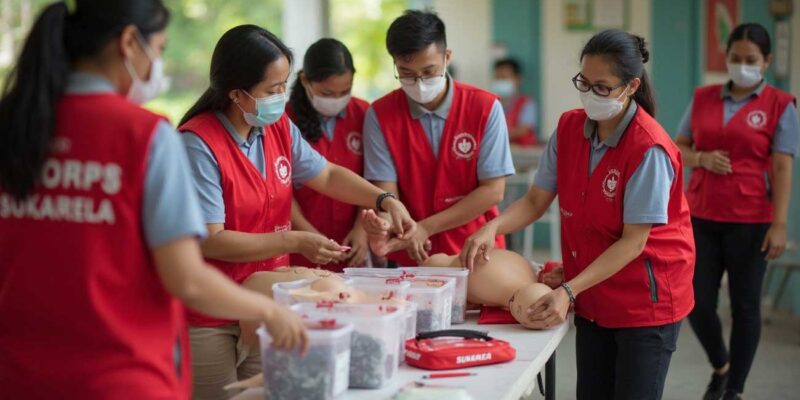Introduction
In every society, there exists a silent yet powerful force that nurtures solidarity, compassion, and resilience in times of peace and crisis alike. This force is none other than volunteerism. Among the most organized and impactful forms of volunteerism in Southeast Asia is Korps Sukarela (often abbreviated as KSR), the Volunteer Corps of the Red Cross or Red Crescent organizations, particularly known within the Indonesian Red Cross Society (Palang Merah Indonesia, PMI).
Korps Sukarela represents the institutionalization of voluntary service. It is a collective of individuals, bound not by financial reward but by a common commitment to humanitarian principles. Through their activities, KSR members become the first responders in emergencies, the facilitators of health education, the champions of blood donation campaigns, and the catalysts for community empowerment.
This article explores the history, structure, roles, values, and contemporary significance of Korps Sukarela, along with the challenges it faces and the future pathways it may take.
Origins and Historical Development
The roots of Korps Sukarela can be traced back to the founding of the Indonesian Red Cross (PMI) in 1945, shortly after Indonesia declared its independence. The establishment of PMI was driven by the urgent need for humanitarian assistance during wartime and the subsequent nation-building period.
As PMI expanded, it became clear that volunteers would be the backbone of its operations. Thus, the concept of Korps Sukarela was formally introduced as a structured body of trained volunteers dedicated to supporting the mission of PMI.
By the 1960s and 1970s, KSR had developed more systematically, with standardized training modules, organizational hierarchies, and clearer roles within local, regional, and national contexts. This professionalization did not diminish the voluntary spirit but rather enhanced the effectiveness of their service.
Today, KSR units exist in schools, universities, workplaces, and community organizations across Indonesia, making them one of the largest volunteer networks in the region.
Structure and Organization
Korps Sukarela operates under the umbrella of the Indonesian Red Cross Society, adhering to its statutes and principles. The organizational structure typically mirrors the hierarchical levels of PMI itself—branch (district), provincial, and national.
-
Membership: KSR members are individuals aged 18 and above who have completed the basic training program. They are often students, professionals, or community members with a passion for service.
-
Training: Training programs equip volunteers with knowledge in first aid, disaster preparedness, public health promotion, and Red Cross principles. Specialized training is also offered in areas such as water rescue, logistics, and psychosocial support.
-
Units: A KSR unit may be established in a school, university, workplace, or community group. Each unit has its own leadership, activity plans, and coordination mechanisms with PMI branches.
-
Coordination: While KSR units have autonomy to design activities suited to their communities, they remain integrated within the broader PMI structure for mobilization during larger-scale emergencies.
This decentralized yet coordinated structure ensures flexibility, local relevance, and national cohesion.
Principles and Values
Korps Sukarela is guided by the Seven Fundamental Principles of the International Red Cross and Red Crescent Movement:
-
Humanity – alleviating human suffering wherever it is found.
-
Impartiality – providing aid without discrimination.
-
Neutrality – not taking sides in hostilities or controversies.
-
Independence – maintaining autonomy while cooperating with governments and institutions.
-
Voluntary Service – motivated by altruism, not financial gain.
-
Unity – one Red Cross or Red Crescent Society per country, open to all.
-
Universality – a global movement with equal responsibilities and duties.
For KSR members, these principles are not abstract ideals but daily guidelines that shape their interactions, decisions, and commitments. They form the ethical foundation that sustains the spirit of voluntary service even in challenging circumstances.
Roles and Functions of Korps Sukarela
The activities of KSR are broad, reflecting the diverse humanitarian needs of society. Some of the most notable roles include:
1. Emergency Response
KSR members are often the first responders in natural disasters such as earthquakes, floods, volcanic eruptions, and landslides. They assist with evacuation, first aid, distribution of relief goods, and coordination in shelters.
2. Health Services
KSR actively promotes health education, organizes blood donation drives, and provides support during public health crises. During outbreaks such as dengue fever or COVID-19, volunteers played crucial roles in disseminating information, assisting vaccination campaigns, and distributing protective equipment.
3. Community Development
Beyond emergencies, KSR engages in long-term community empowerment projects. This includes training communities in disaster preparedness, supporting environmental initiatives, and fostering youth engagement in social issues.
4. Capacity Building
KSR provides its members with opportunities for personal development—leadership training, teamwork skills, and technical expertise. This makes KSR not only a humanitarian force but also a school of character and citizenship.
5. International Cooperation
Though rooted in local contexts, KSR is part of the global Red Cross and Red Crescent network. Volunteers may participate in international forums, cross-border relief operations, and youth exchanges, fostering global solidarity.
The Spirit of Volunteerism
At the heart of Korps Sukarela is the spirit of volunteerism. Unlike professional humanitarian workers, KSR members dedicate their time without expecting monetary compensation. Their reward lies in the satisfaction of helping others, the bonds of solidarity, and the sense of purpose derived from meaningful action.
This spirit is nurtured through shared experiences—long nights in evacuation camps, joint efforts in community projects, and moments of empathy with those in need. These experiences forge a strong sense of brotherhood and sisterhood among members, transcending differences of background, religion, or ethnicity.
Case Studies: Korps Sukarela in Action
The 2004 Aceh Tsunami
When the Indian Ocean tsunami struck Aceh, Indonesia, KSR volunteers were among the first to respond. Despite personal losses, many members worked tirelessly in search and rescue operations, distribution of relief, and psychosocial support. Their dedication became a symbol of resilience and compassion.
The COVID-19 Pandemic
During the global pandemic, KSR units mobilized to educate communities on hygiene, support testing and vaccination centers, and combat misinformation. Their grassroots presence allowed them to bridge gaps between government programs and local communities.
Local Initiatives
In smaller-scale contexts, KSR units regularly organize blood donation campaigns, school health programs, and disaster simulations. These initiatives strengthen local resilience and foster trust between PMI and the communities it serves.
Challenges Faced by Korps Sukarela
Despite its many achievements, KSR faces several challenges:
-
Sustainability of Volunteerism: As economic pressures rise, sustaining long-term volunteer commitment can be difficult. Many young members leave after graduation or securing jobs.
-
Resource Constraints: Funding, logistics, and equipment are often limited, affecting the capacity of KSR units to operate effectively.
-
Safety and Security: In conflict zones or disaster-prone areas, ensuring the safety of volunteers is a pressing concern.
-
Recognition and Support: Volunteers sometimes face a lack of recognition from authorities or society, which may discourage their sustained engagement.
-
Digital Adaptation: In the modern era, adapting to digital platforms for coordination, training, and outreach is essential but still uneven across units.
Future Prospects
The future of Korps Sukarela lies in its ability to adapt while remaining true to its principles. Some pathways for development include:
-
Strengthening Youth Engagement: By integrating volunteerism into education and youth culture, KSR can secure a steady influx of committed members.
-
Digital Transformation: Leveraging technology for online training, disaster simulations, and information campaigns will expand reach and efficiency.
-
Partnerships: Collaborating with NGOs, government agencies, and private companies can provide resources and amplify impact.
-
Professional Development: Offering certifications and recognition can motivate volunteers and enhance their employability while maintaining the voluntary spirit.
-
Global Solidarity: Increasing participation in international humanitarian networks will enrich KSR’s experience and contribution.
Conclusion
Korps Sukarela is more than just a volunteer organization—it is a living embodiment of humanity’s highest ideals. Through its structured yet flexible approach, it bridges the gap between professional humanitarian systems and grassroots communities.
Its members, driven by compassion and solidarity, remind us that the strength of a nation is not only measured by its economic or political power but also by the willingness of its people to serve one another selflessly.



